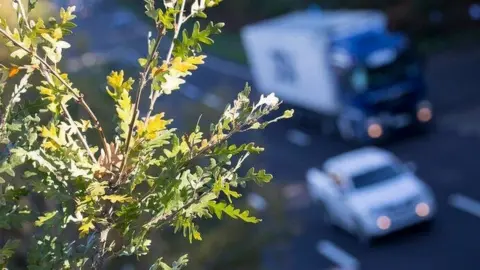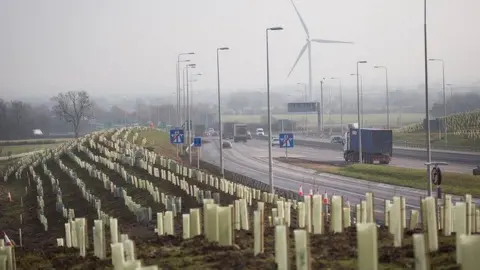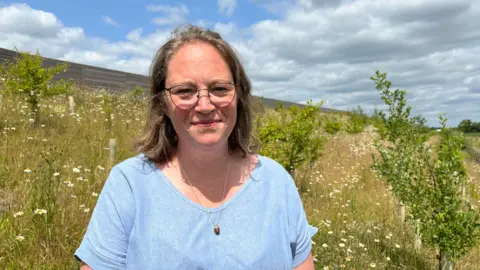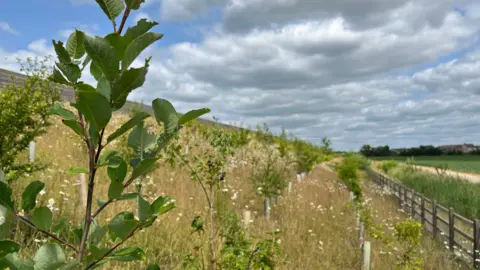Residents plant own trees to replace dead A14 ones
 National Highways
National HighwaysPeople have taken to planting their own trees along the side of the A14 after the deaths of "a large proportion" of the many saplings that were originally planted.
More than 860,000 trees were planted as part of the £1.5bn A14 upgrade between Cambridge and the A1, which was completed in 2020, but many died, and had to be replaced by National Highways.
The company said between October last year and April, 165,000 trees and shrubs were planted and that almost 90% survived.
However, Cambridgeshire County Council said it had not been told where the replanting took place, and some local residents had begun planting their own.
About 270 hectares (670 acres) of habitat, including 40 native tree and shrub species, was created for wildlife along the new section of the A14, which realigned the dual carriageway south of Huntingdon.
National Highways said in 2022 about about 20-30% of the trees had died but all were replanted.
In a more recent statement it said: "Between October 2023 and April 2024 – the optimum planting season – 165,000 trees and shrubs were planted.
"Our latest survey showed that nearly 90% of these trees have survived."
 National Highways
National HighwaysHowever, people living along the road have taken matters into their own hands.
Vhari Russell, who lives close to the A14 in Brampton and founded the rewilding group Creating Nature's Corridors, said: "If you are really passionate about something you can sit back and wait for other people to fix it, or you can try and fix it yourself."
She said trees were vital to reduce the noise from the busy road and it was her mission to "plant more greenery to try to protect ourselves from it".
"We had grown various different trees in the garden in pots and we've planted all of those into the bank - I think we've probably put in 150."
 Tom Jackson/BBC
Tom Jackson/BBCSpeaking about the failure of the initial planting, Ellen Thurman-Lavey, from Barcham Trees near Ely, said saplings relied on a number of factors to survive.
"During Covid, many of us will remember that spring was really warm and we had a couple of hot summers after that," she said.
"Those sorts of climatic events have a massive impact on that sort of planting because the rainfall is not there and the trees therefore don't get their root systems away and they struggle, from the beginning."
She said without intervention - watering - it would be difficult for trees to thrive.
Liam Beckett, Liberal Democrat county councillor for Brampton and Buckden, said: "We're asking them [National Highways] to do what they said they would do, which is to mitigate the negative impacts of this on local residents.
"It doesn't seem a huge thing to ask."
 Tom Jackson/BBC
Tom Jackson/BBCThe scheme is to be discussed at a county council meeting later.
The agenda paper states "trees initially planted by the A14 programme experienced high rates of death, and National Highways committed to a replanting programme".
However, it also states that documents provided to the council's biodiversity team contained only basic information.
"National Highways has stated that it planted 165,000 trees and shrubs between October 2023 and April 2024," the agenda says.
"The council does not know where replanting has taken place, and the observations from officers traveling along the new A14 is that replanting appears to have been in a few limited areas."
The council said it would continue to highlight the issue to National Highways.
Follow Cambridgeshire news on BBC Sounds, Facebook, Instagram and X.
